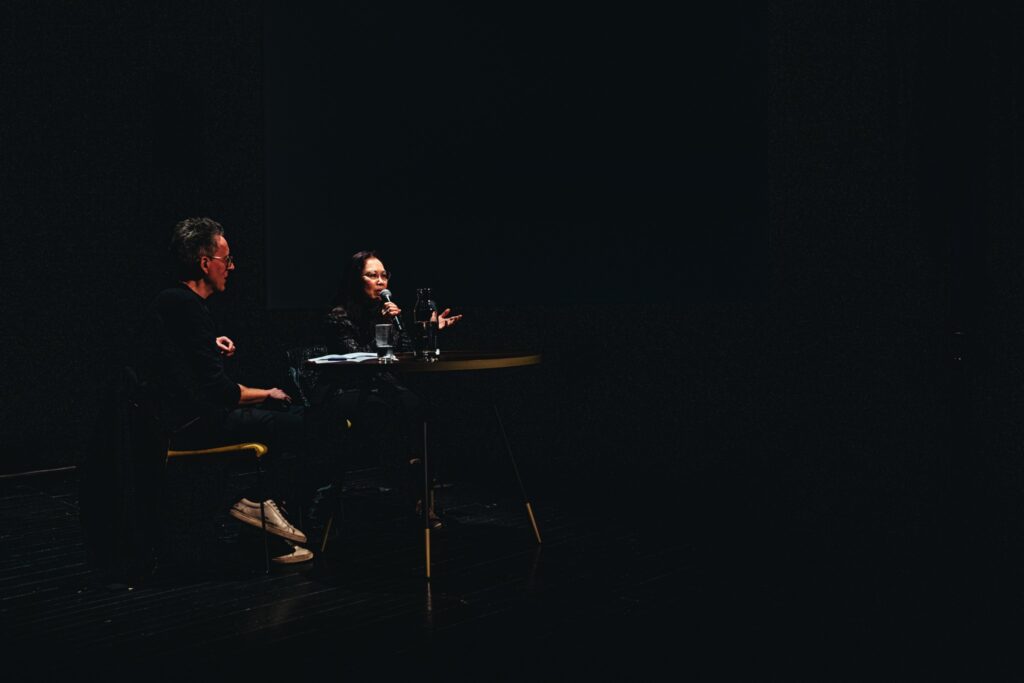In the context of the Courtisane festival 2023 (29 March – 2 April). Part of the event series Echoes of Dissent, produced by Courtisane, argos and Auguste Orts, in the context of the KASK and Conservatory School of Arts research project with the same title.
“I do not intend to speak about; just speak nearby.” With these words, spoken in her debut film, Reassemblage (1982), Trinh T. Minh-ha describes the attitude she adopts throughout her oeuvre. An attitude characterized by an aversion to institutional authority and expertise, and instead grounded in embodied experience and self-reflection. A way of positioning herself in relation to the world that expresses itself in all aspects of her films: verbally, musically, visually. For example, in Reassemblage, the first of two films she made in West Africa, she exposes the transformations that inevitably take place when attempting to put the impossible experience of ‘what’ comprises Senegalese culture into cinematic form. That same urge to break down patterns of expectation and challenge the interpretive claims of authoritarian forms is also found in her writing. Her influential book Woman, Native, Other (1989, in French version: Femme, indigène, autre, Paris: B42, 2022 ), for instance, is primarily a questioning of the contradictory imperatives faced by the ‘I’, as a ‘Third World woman’, in creating and critiquing the role of creator and intellectual across literature, anthropology and the arts.
Born in Hanoi, Trinh T. Minh-ha emigrated to the US during the Vietnam War, where she studied music composition, ethnomusicology and French literature. Since the early 1980s, she has been problematising the forms of reductionism and essentialism that influence our self-image and worldview. By her own admission, her films are partly motivated by her experiences in former colonised Vietnam – experiences that she clearly recognised, shared and re-lived in Africa. These life experiences account for her decision to make films that point to the process of the construction of meaning, and to herself as an active element in that process. Her films are grounded in the question: why not approach a country, a people, a culture by starting with what comes with an image or with a name, like ‘Senegal’, but also ‘Vietnam’, ‘China’, or ‘Japan’? What exactly stands for, characterises and speaks to a cultural and political event? How does the medium of cinema allow one to show, tell and receive rather than merely represent? In other words, Trinh considers a given name or a recorded image not as finalities but as points of departure. In Shoot for the Contents (1991) and her latest film, What About China? (2022), she does not search for the ‘true’ face of China but probes beneath and with the surface of the country’s image – an image, determined by the media and other forms of information, that’s taken for granted in our daily relationship to the country.
The space in which Trinh T. Minh-ha works and creates is where she confronts and leaves behind the world of beaten paths and traffic regulations. She seeks the in-between spaces where established boundaries can be rearranged and shifted, including those of the ‘I’. In each of her films, rather than as a source, the ‘I’ is deployed as an open site where other manifestations of the ‘I’ can take up residence and incongruous elements can converge. In Surname Viet Given Name Nam (1989), she approaches Vietnamese culture in all its multiplicity without endorsing the legitimized subjectivity of the ‘insider’. Rather than constructing a single homogeneous perspective or an ‘unmediated’ personal account, she portrays culture through popular memory and oral traditions, primarily concerning Vietnamese women, while simultaneously addressing the politics of interviewing and the politics of translation. “Crisscrossing more than one occupied territory at a time,” she writes, “she remains perforce inappropriate/d – both inside and outside her own social positionings… A trajectory across variable praxes of difference, her (un)location is necessarily the shifting and contextual interval between arrested boundaries.”
In contrast to the endless discourse about a virtual boundlessness in a globalised world, Trinh T. Minh-ha unveils and punctures the separations and demarcations that define our place in and relationship to the world. “Reality is delicate,” she says in Reassemblage, and it is that constant, wavering probing of reality, filled with a passion called wonder, averse to claims of authenticity, authority or neutrality, that shows from her work the power to break out of our compartmentalised world.
Courtisane festival 2023 – Conversation with Trinh T. Minh-ha from Courtisane on Vimeo.
